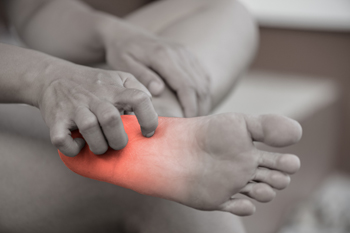
Peripheral neuropathy is a complex condition that affects the peripheral nervous system, leading to a range of symptoms that can significantly impact the feet. This disorder results from damage to the nerves outside the brain and spinal cord, often caused by various underlying conditions such as diabetes, infections, or autoimmune diseases. When it affects the feet, individuals may experience numbness, tingling, or a sensation of pins and needles. This can progress to sharp, shooting pain and muscle weakness. As the condition advances, it can lead to a loss of balance and coordination, increasing the risk of falls. The feet may also become more susceptible to injuries, blisters, and ulcers, with a reduced ability to detect pain or discomfort. Managing peripheral neuropathy often involves addressing the underlying cause, along with pain management and lifestyle adjustments. If you have symptoms of neuropathy, it is suggested that you schedule an appointment with a podiatrist who can perform routine foot exams which may help to prevent potential complications.
Neuropathy
Neuropathy can be a potentially serious condition, especially if it is left undiagnosed. If you have any concerns that you may be experiencing nerve loss in your feet, consult with Jim Maxka, DPM from South Penn Foot & Ankle Associates. Our doctor will assess your condition and provide you with quality foot and ankle treatment for neuropathy.
What Is Neuropathy?
Neuropathy is a condition that leads to damage to the nerves in the body. Peripheral neuropathy, or neuropathy that affects your peripheral nervous system, usually occurs in the feet. Neuropathy can be triggered by a number of different causes. Such causes include diabetes, infections, cancers, disorders, and toxic substances.
Symptoms of Neuropathy Include:
- Numbness
- Sensation loss
- Prickling and tingling sensations
- Throbbing, freezing, burning pains
- Muscle weakness
Those with diabetes are at serious risk due to being unable to feel an ulcer on their feet. Diabetics usually also suffer from poor blood circulation. This can lead to the wound not healing, infections occurring, and the limb may have to be amputated.
Treatment
To treat neuropathy in the foot, podiatrists will first diagnose the cause of the neuropathy. Figuring out the underlying cause of the neuropathy will allow the podiatrist to prescribe the best treatment, whether it be caused by diabetes, toxic substance exposure, infection, etc. If the nerve has not died, then it’s possible that sensation may be able to return to the foot.
Pain medication may be issued for pain. Electrical nerve stimulation can be used to stimulate nerves. If the neuropathy is caused from pressure on the nerves, then surgery may be necessary.
If you have any questions, please feel free to contact our office located in Hanover, PA . We offer the newest diagnostic and treatment technologies for all your foot care needs.
